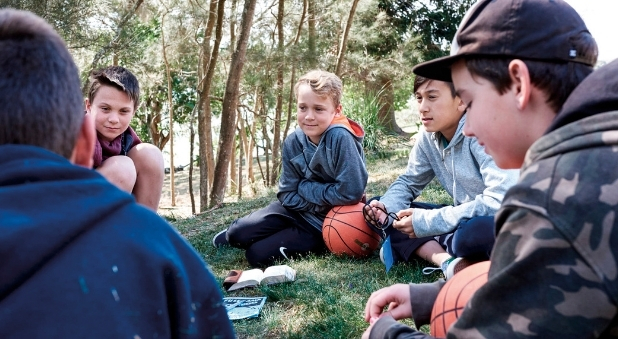The early nineties couldn’t seem more different to our current time. It was a time when Terminator 2 was in cinemas, Mario and Luigi were all the rage and “The Horses'' by Darrel Braithwaite was topping ARIA charts. Three decades later, teens dance on Tik Tok (a video social media platform) and aren’t sure what a cassette tape does.
Trends come and go, but there are unchanging principles that act as the foundation for a faithful youth ministry. The Rev Cameron Hyslop would know – he has served as the Youth Minister at Jannali for three decades. He shares five ways youth ministry has changed yet remained the same.
The Bible is a timeless essential
Any youth ministry worth doing must have the essentials, including using the Bible and praying continually. These have been the foundation for many faithful youth groups for years, including the ones at Jannali.
“This doesn’t apply just to youth ministry, it applies to every ministry,” says Mr Hyslop. “The gospel message doesn’t change, but how we articulate it might vary depending on the generation. God’s word hasn’t changed, so make sure everything is based on God’s word.”
“This doesn’t apply just to youth ministry, it applies to every ministry,”
The goal of youth ministry is to disciple youth and help them grow more like Christ. One way Mr Hyslop encourages this is by asking teens to plan their next step after conversations and considering Bible passages. “If it doesn’t translate into an action of some kind, I’m not helping them move forward.”
Teens long to belong
Training for youth ministry in Sydney’s north and southwest before landing in Jannali convinced Mr Hyslop that teens everywhere desire to be loved and belong. As they explore and work out their identity, teens have always strived to know where they fit in the world.
“They need to know they’re accepted for who they are,” says Mr Hyslop. “It’s expressed differently but they have the same desire to know they’re accepted. [Therefore], they need to know how to be right with God.
“I recall in the 90s if there were any spiritual questions it was ‘What happens to someone when they die?’ That question is still there. It’s a question of security, whereas the identity stuff is about significance. Who am I? Am I a person of value? Will I be seen as a person of value if I feel this way about myself? That goes back to acceptance.”
Teens are forming their identity
Teens have always wrestled with who they are, although recently this has been dominated by issues surrounding sexuality, gender and mental health. There is now less taboo surrounding mental wellbeing, with issues, support and therapists spoken about freely. “There were lots of people who weren’t getting the help they needed back then,” says Mr Hyslop. “I wonder if schools are trying to push resilience because they’re recognising young people don’t have the tools to stand tall in the face of difficult situations.”
The shift in screen time amplifies issues
The number of screens and control of screen time has shifted from one television controlled by a parent to multiple screens owned by teens. Setting boundaries around screen and viewed media has become a challenge, with many youth finding workarounds to net filtering programs.
This has heightened issues around body image, peer pressure, gaming addiction and access to pornography. “The problems tend to be around social stuff, expectations, and needing to have the right look, but that existed before with the Dolly magazine,” says Mr Hyslop. “A lot of the gaming consumes hours, and there’s a lot of people who say they can see it’s not helping.”
Teens have always been curious about the gospel
Popular culture and discussions in the public arena have changed the type of questions teens are asking of God, but teens are no less interested.
“There is a lot about gender that definitely wasn’t there in the nineties,” says Mr Hyslop. “There’s a false position that to accept someone, you have to agree with them. It’s a misunderstanding of tolerance. That’s a challenge always.”
Three decades of youth ministry have formed six core values that Mr Hyslop holds strongly:
Young people are not the church of the future, they’re the church of today
Young people are the ministers – “Every young Christian in our church is a youth minister, they all have access to peers and the gospel message. My job is to equip them to do their ministry.”
If you’re there, be all there – “There’s nothing worse than a person undertaking a ministry, but you can tell they’d rather be somewhere else. It’s a massive commitment because it’s a massive ministry. It’s incredibly important so it’s worth the effort.”
Value your team and their contributions
Communicate with and involve parents – “At the end of the day, if the parents aren’t on board, you have no youth.”
Love the youth for who they are – “Youth don’t want me to be a young person, they want me to be someone who will listen and have Bible knowledge to help them and encourage them in decision making.”






















